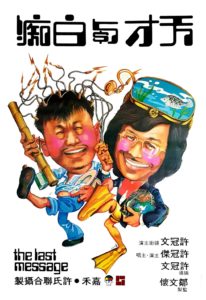The Last Message
天才与白痴
Hong Kong, 1975, colour, 2.35:1, 95 mins.
Director: Xu Guanwen 许冠文 [Michael Hui].
Rating: 6/10.
Second comedy directed by Hong Kong comedian Xu Guanwen [Michael Hui] is slightly more polished than his hit debut, Games Gamblers Play.
Hong Kong, the present day. Tian (Xu Guanwen) and Li (Xu Guanjie) are an orderly and a male nurse at Hengsheng Psychiatric Hospital. One day a crazy man, Zheng Ming (Qiao Hong), is admitted with a bag full of Ming-dynasty antiques. Unfortunately they’re all broken, so Tian and Li can’t sell them for money. After Zheng Ming dies from a heart attack, Tian and Li find his daughter, Princess (Eileen Humphreys), who reveals that her father found a sunken boat off the coast of Hong Kong full of relics. Tian and Li set out to find it, with their usual dreams of instantly becoming rich.
REVIEW
Also in the Genre Films section [of the 1976 London Film Festival] was The Last Message 天才与白痴, the enormously successful follow-up by Hong Kong director Xu Guanwen 许冠文 [Michael Hui] to his previous comedy Games Gamblers Play 鬼马双星 (1974). It provided the first chance for National Film Theatre audiences to savour an example of Cantonese comedy, and Xu’s relatively accessible style provides an ideal entree. The Last Message (the Chinese title approximates to “Born Genius and Born Idiot”) is altogether less barbed than Games, but that extra bit more polished: Xu (well-known in Hong Kong also for his acting) and pop idol brother Xu Guanjie 许冠杰 [Samuel Hui] make an agreeable pair on a broad double-stooge basis, and their brand of lunacy, while skilfully tailored to Cantonese tastes and loaded with local allusions every part as obscure as those in the Carry On series must be to non-Britons, is also more outward-looking than many of the regular, run-of-the-mill examples. The humour (the brothers play an orderly and a psychiatrist in a [mental] hospital) ranges from Tashlinesque situations to moments of unique Xu irreverence: Xu Guanwen whipping the gold fillings from dead bodies, or Xu Guanjie playing strip-poker in the mortuary. The film is also a reductio ad ridenda of Hong Kong financial greed – a recurrent feature of its cinema but here given a contemporary bite quite absent from mainstream Mandarin cinema, with everyone (even a surgeon in mid-operation) obsessed with betting on the Quartet (racehorses) as the sole way to riches, and Xu Guanjie rhapsodising that Nothing Is Better Than Money 天才白痴钱钱钱. Xu Guanwen has just completed his latest film – as usual swathed in secrecy until its unveiling – and one hates to carp about any Chinese films gaining [western film] festival coverage, but one hopes next year to see something more representative of the Mandarin industry, like The Chasing Game 追球•追求 (1976) by [Taiwan director] Chen Yaoqi 陈耀圻 [Richard Chen] or one of the several quality Taiwan melodramas by Li Xing 李行.
CREDITS
Presented by Golden Harvest (HK). Produced by Golden Harvest (HK), Hui Brothers (HK).
Script: Xu Guanwen [Michael Hui], Xue Zhixiong [Louis Sit], Liu Tianci. Photography: Yu Jin. Editing: Zhang Yaozong. Music: Gu Jiahui [Joseph Koo], Xu Guanjie [Samuel Hui]. Song music: Xu Guanjie [Samuel Hui]. Song lyrics: Xu Guanjie [Samuel Hui], Xue Zhixiong [Louis Sit]. Art direction: uncredited. Sound: Zhou Shaolong.
Cast: Xu Guanwen [Michael Hui] (Tian), Xu Guanjie [Samuel Hui] (Li, male nurse), Qiao Hong [Roy Chiao] (Zheng Ming), Eileen Humphreys (Princess, Zheng Ming’s daughter), Liu Yifan (police chief), Tian Jun (traffic policeman), Gu Jiahui [Joseph Koo] (surgeon), Kang Jiaxin (female nurse), Xu Guanying [Ricky Hui] (hotel waiter), Wang Chen (Wang, doctor), Jiang Nan (antiques dealer), Feng Yi (Mr. Zhou), Shi Tian [Dean Shek] (hotel receptionist), Lu Qian (Catholic priest), Tao Sangu (Mrs. Zhou), Xigua Bao [Lin Gen] (mental patient), Hao Lvren (mental patient), Gan Lu (Tian’s mother), Lianhua Dayuedui [The Lotus] (band), Bi Lide, Hong Zhan, Lei Shushu.
Release: Hong Kong, 21 Aug 1975.
(Review section originally published in UK monthly films and filming, Feb 1977, article on 1976 London Film Festival. Modern annotations in square brackets.)
